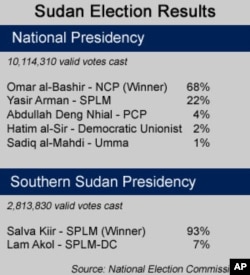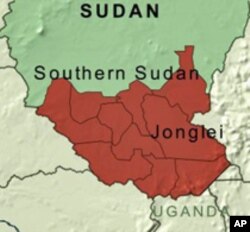A coalition of advocacy groups has launched a U.S. advertising drive following Sudan’s flawed elections. The Sudan Now campaign is urging top American officials led by Secretary of State Hillary Clinton and U.N. Ambassador Susan Rice to make Sudan a U.S. foreign policy priority.
David Abramowitz of Humanity United, one of the anti-genocide coalition members, says the Obama administration needs to give greater attention to the tough benchmarks it outlined last October based on critical events and conditions that Sudan faces as it prepares for a January independence referendum for Southern Sudan.
“We believe, as Humanity United being a member of Sudan Now campaign, that there needs to be a significant increase in U.S. attention to this matter. The secretary of state and the president both need to get more personally engaged in this issue. And we’re hopeful that that is being recognized in the administration…We’re hoping that Secretary of State Clinton and the president will be engaging with their counterparts, both in Europe and the African continent,” he advised.
Although Sudan’s first national polls in 24 years were conducted without violence and won guarded approbation from the African Union, the vote was considered widely flawed by U.S. and European election monitors. Sudan Now’s Abramowitz suggests that the Obama administration’s cautious approach, while intending to ensure a peaceful transition to next year’s independence referendum, missed an important opportunity to press Khartoum to curb violence and press for desperately needed reforms.
“I think the administration looked at the elections as a very important marker to get through in order to get to the next stage of the process in the north-south negotiations. And they unfortunately did not give public recognition to some of the issues that arose – particularly the offensive that was launched on Darfur with the use of militias and forces from the central government, as well as a number of ways in which the Khartoum government manipulated the elections to ensure that the results would be a huge victory for President [Omar Hassan al-]Bashir. [These] were things that the administration should have been more forceful about and could have had a more significant impact,” he said.
Advocacy groups have cited four primary benchmarks for which Khartoum should be held accountable. These include providing access for the return of humanitarian groups to Darfur, conducting open discussions for implementation of reforms mandated by the 2005 Comprehensive Peace Agreement (CPA), enforcing accountability and government cooperation with International Criminal Court (ICC) probes of war crimes allegedly committed by President Bashir and others, and stepped up activity in north-south negotiations to safeguard understandings that will enable all sides to conduct and abide by the outcome of the January referendum.
Abramowitz acknowledges that if the referendum takes placed as planned, most likely its outcome will favor independence for semi-autonomous Southern Sudan.
“By January of 2011, there’s going to be a major decision regarding whether the people of Sudan are going to split. And right now, everything looks like the popular sentiment in the south and among southern citizens and those who live in the north is that the country is going to split. There are a number of complicated diplomatic issues, including international diplomatic issues on the African continent that need to be worked out,” he observed.
The most thorny issues that both northern and southern negotiators will have to tackle include revenue sharing of oil profits from the lucrative Abyei region, which straddles the north-south border, the demarcation of borders that will allow migrating pastoralists to straddle the boundaries of two newly formed states, the consular interests and identity problems of thousands of southerners who reside in the north, and various water, debt, and financial concerns. Abramowitz says any one of these issues could sabotage or delay Sudanese determination to carry out measures necessary to uphold terms of the 2005 CPA.
“There were some good signs during the past few months that parts of the NCP [Sudan’s ruling National Congress Party] is coming to accept the idea that the south is going to leave. However, if there is a way that the referendum is manipulated or delayed or halted so that the citizens of the south do not get to express their preferences, then I think there is a very high degree of risk that the CPA will totally collapse and mass violence will break out,” he cautioned.
For these reasons, the eight organizations that make up the Sudan Now campaign are urging the U.S. policymakers to step up their assessment of benchmarks announced publicly by President Obama administration last October in order to hold the parties accountable if obstacles persist.
Advocacy groups that have signed on to the ad campaign by Sudan Now include the Enough Project, Humanity United, the Save Darfur Coalition, American Jewish World Service, the Genocide Intervention Network, Stop Genocide Now, Investors Against Genocide, and Physicians for Human Rights.











